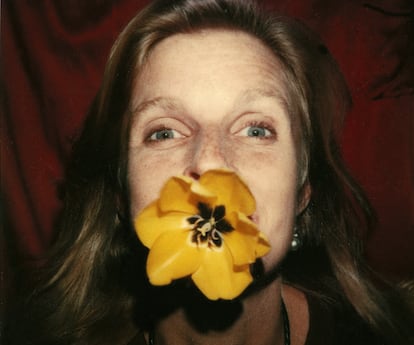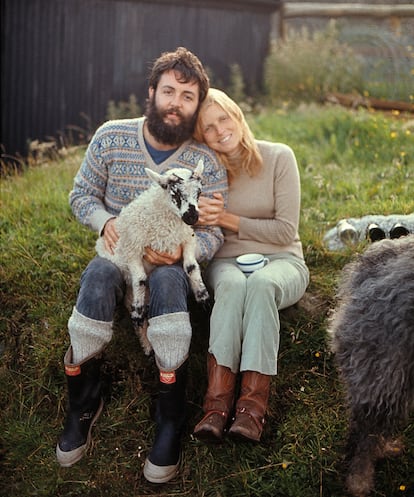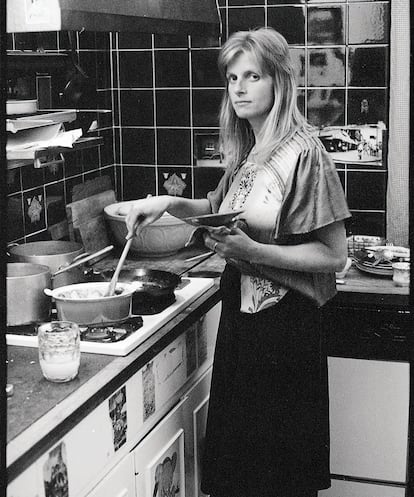Linda McCartney, still the face of vegetarianism 40 years on
Her new recipe book highlights the influence the photographer has had on vegetarian cuisine and environmental awareness

Paul McCartney vividly remembers the day he and his late wife Linda McCartney decided to stop eating meat. Both had been raised in families that ate traditional fare with meat, such as chops and sausages, at the center of any meal in their respective households.
In the prologue of Linda McCartney’s Family Kitchen, the recipe book that has just been published in Spain, the former singer of The Beatles describes how he and Linda decided to change their diet forever: “One day Linda and I were having Sunday lunch with the family at our farm in Scotland and gazing out of the window at the baby lambs in the fields nearby. We were saying how cute and beautiful they were, then looked at our plates. We were eating leg of lamb. [...] That was the turning point for us and that’s when it all started.”
The “all” to which Paul McCartney refers encompassed a wholehearted commitment to spreading the word about the benefits of vegetarianism, respect for animals and environmental awareness. Linda McCartney’s passion, based on her and her family’s experience, led her to pen her first recipe book with food writer Peter Cox, and to create her vegetarian food company, Linda McCartney Foods, which still markets products today. While Paul’s career with The Beatles and then with Wings meant the couple were never going to go hungry, Linda’s entrepreneurial savvy gave her an empire and a fortune of her own.
Over the years, the photographer and mother of three of Paul McCartney’s five children, who died tragically of breast cancer in 1998, aged 56, became a vegetarian influencer, particularly in the UK and US, at a time when vegetarianism was far from mainstream. She used her popularity to shift public opinion, as well as influencing her closest friends. “The last thing we ever wanted was to alienate anyone by lecturing them,” Paul recalls in the prologue, but “Linda was forthright and if we were at a dinner party and someone was eating meat, she might call them out on it, but in a charming way.”
The McCartneys’ efforts to promote vegetarianism began more than four decades ago, when vegetarians were viewed in a very different way. This is corroborated by David Román, president of the Spanish Vegetarian Union. “Linda and her husband Paul became vegetarians in the 1970s, which is when they also undertook the harrowing task of finding out what was going on in slaughterhouses,” he says. “The most interesting thing about Linda was that she shared her concern and knowledge with others. It helped a lot to normalize vegetarianism. We have to bear in mind that, not so long ago, to be a vegetarian was to be a freak. It had a stigma attached to it. Linda not only contributed to the normalization of vegetarianism, but she made it look attractive and interesting.”
Laura Veraguas is one of Spain’s top vegetarian chefs. She has launched a gastronomic project aimed at nudging us towards looking afresh at plant-based cuisine. Not only does she work as a consultant but she is in charge of a catering business that uses local, wild and organic products and non-aggressive techniques and procedures. According to Laura, Linda McCartney was the original food pioneer who blazed the trail in vegetarian cooking. “I think it was quite something to create an innovative and fun recipe book – recipes that were not boring,” she says. “She is a great role model for her time. Now we are in a different period, but in the 70s, to take this path was to be accused of being strange, when in fact they were just ahead of their time. I have no doubt that in the future we will hardly eat animal protein, but we are in a very different era to the one they lived in.”

In Linda McCartney’s Family Kitchen, easy and practical recipes are interspersed with an album of family photographs and the reflections that led Linda to give up meat. On one page, in large letters, is a phrase she used to explain why she had decided to be a vegetarian: “Fish, chicken and lamb have hearts and eyes, children and feelings, just like the human animal.” A self-taught cook, Linda was also keen to flag up the fun that can be had in the kitchen. This was, in fact, one of the driving forces behind her passion for cooking because it is “the only way for recipes to be passed on to the next generation.”
The McCartneys’ daughter Stella McCartney, a designer who, like her mother, is committed to the environment and animal rights, also pays tribute to Linda’s legacy in the book. “We all know how to cook and that’s thanks to mom,” she says. “Like her, I adore our fellow beings and only cook plant-based recipes. That’s cooking to nourish the soul and that’s how she prepared food: to nourish the soul.”

Tu suscripción se está usando en otro dispositivo
¿Quieres añadir otro usuario a tu suscripción?
Si continúas leyendo en este dispositivo, no se podrá leer en el otro.
FlechaTu suscripción se está usando en otro dispositivo y solo puedes acceder a EL PAÍS desde un dispositivo a la vez.
Si quieres compartir tu cuenta, cambia tu suscripción a la modalidad Premium, así podrás añadir otro usuario. Cada uno accederá con su propia cuenta de email, lo que os permitirá personalizar vuestra experiencia en EL PAÍS.
¿Tienes una suscripción de empresa? Accede aquí para contratar más cuentas.
En el caso de no saber quién está usando tu cuenta, te recomendamos cambiar tu contraseña aquí.
Si decides continuar compartiendo tu cuenta, este mensaje se mostrará en tu dispositivo y en el de la otra persona que está usando tu cuenta de forma indefinida, afectando a tu experiencia de lectura. Puedes consultar aquí los términos y condiciones de la suscripción digital.









































